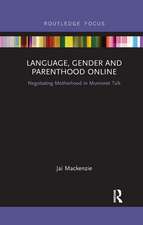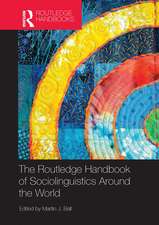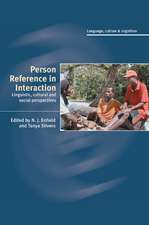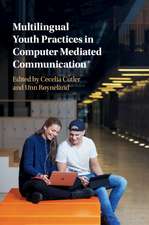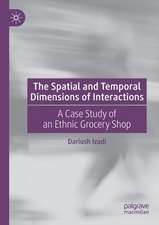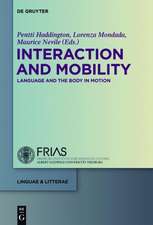The Morality of Knowledge in Conversation: Studies in Interactional Sociolinguistics, cartea 29
Editat de Tanya Stivers, Lorenza Mondada, Jakob Steensigen Limba Engleză Paperback – 6 aug 2014
| Toate formatele și edițiile | Preț | Express |
|---|---|---|
| Paperback (1) | 320.17 lei 6-8 săpt. | |
| Cambridge University Press – 6 aug 2014 | 320.17 lei 6-8 săpt. | |
| Hardback (1) | 782.83 lei 6-8 săpt. | |
| Cambridge University Press – iun 2011 | 782.83 lei 6-8 săpt. |
Din seria Studies in Interactional Sociolinguistics
- 15%
 Preț: 387.54 lei
Preț: 387.54 lei -
 Preț: 201.21 lei
Preț: 201.21 lei -
 Preț: 360.01 lei
Preț: 360.01 lei - 23%
 Preț: 719.82 lei
Preț: 719.82 lei -
 Preț: 153.76 lei
Preț: 153.76 lei -
 Preț: 356.90 lei
Preț: 356.90 lei -
 Preț: 204.48 lei
Preț: 204.48 lei - 11%
 Preț: 639.92 lei
Preț: 639.92 lei - 14%
 Preț: 757.19 lei
Preț: 757.19 lei - 11%
 Preț: 451.15 lei
Preț: 451.15 lei -
 Preț: 344.40 lei
Preț: 344.40 lei -
 Preț: 320.55 lei
Preț: 320.55 lei -
 Preț: 357.13 lei
Preț: 357.13 lei - 11%
 Preț: 552.17 lei
Preț: 552.17 lei -
 Preț: 299.44 lei
Preț: 299.44 lei -
 Preț: 344.02 lei
Preț: 344.02 lei -
 Preț: 450.99 lei
Preț: 450.99 lei -
 Preț: 303.60 lei
Preț: 303.60 lei -
 Preț: 279.76 lei
Preț: 279.76 lei -
 Preț: 286.13 lei
Preț: 286.13 lei - 11%
 Preț: 464.02 lei
Preț: 464.02 lei - 11%
 Preț: 432.39 lei
Preț: 432.39 lei - 11%
 Preț: 691.45 lei
Preț: 691.45 lei -
 Preț: 434.12 lei
Preț: 434.12 lei -
 Preț: 406.83 lei
Preț: 406.83 lei -
 Preț: 347.98 lei
Preț: 347.98 lei -
 Preț: 304.56 lei
Preț: 304.56 lei -
 Preț: 359.80 lei
Preț: 359.80 lei -
 Preț: 240.63 lei
Preț: 240.63 lei -
 Preț: 322.29 lei
Preț: 322.29 lei - 14%
 Preț: 783.16 lei
Preț: 783.16 lei
Preț: 320.17 lei
Nou
Puncte Express: 480
Preț estimativ în valută:
61.27€ • 65.51$ • 51.08£
61.27€ • 65.51$ • 51.08£
Carte tipărită la comandă
Livrare economică 17 aprilie-01 mai
Preluare comenzi: 021 569.72.76
Specificații
ISBN-13: 9781107671546
ISBN-10: 110767154X
Pagini: 356
Ilustrații: 15 b/w illus. 3 tables
Dimensiuni: 152 x 230 x 20 mm
Greutate: 0.48 kg
Editura: Cambridge University Press
Colecția Cambridge University Press
Seria Studies in Interactional Sociolinguistics
Locul publicării:New York, United States
ISBN-10: 110767154X
Pagini: 356
Ilustrații: 15 b/w illus. 3 tables
Dimensiuni: 152 x 230 x 20 mm
Greutate: 0.48 kg
Editura: Cambridge University Press
Colecția Cambridge University Press
Seria Studies in Interactional Sociolinguistics
Locul publicării:New York, United States
Cuprins
Introduction; 1. Knowledge, morality and affiliation in social interaction Tanya Stivers, Lorenza Mondada and Jakob Steensig; Part I. Affiliational Consequences of Managing Epistemic Asymmetries: 2. The management of knowledge discrepancies and of epistemic changes in institutional interactions Lorenza Mondada; 3. Giving support to the claim of epistemic primacy: yo-marked assessments in Japanese Kaoru Hayano; 4. Morality and question design: 'of course' as contesting a presupposition of askability Tanya Stivers; 5. Addressing epistemic incongruence in question-answer sequences through the use of epistemic adverbs Trine Heinemann, Anna Lindström and Jakob Steensig; 6. The epistemics of make-believe Jack Sidnell; Part II. Epistemic Resources for Managing Affiliation and Alignment: 7. Territories of knowledge, territories of experience: empathic moments in interaction John Heritage; 8. The terms of not knowing and social affiliation Leelo Keevallik; 9. Proposing shared knowledge as a means of pursuing agreement Birte Asmuß; 10. Ways of agreeing with negative stance taking Auli Hakulinen and Marja-Leena Sorjonen; 11. Epistemics and embodiment in the interactions of very young children Mardi Kidwell; Part III. Toward a Theory: 12. Sources of asymmetry in human interaction: enchrony, status, knowledge and agency N. J. Enfield.
Descriere
This book demonstrates how we monitor others' rights to, and responsibilities for, knowledge in conversation, and their consequences for affiliation.





